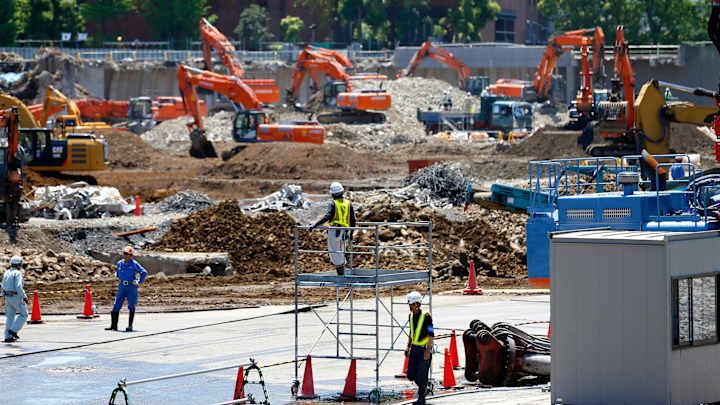Japan leader announces redo for costly Tokyo Olympic stadium

TOKYO (AP) Japan scrapped the design of the Olympic stadium for the 2020 Tokyo Games because of soaring costs Friday and said it will reopen bidding for a new plan, in a stunning reversal that leaves the 2019 Rugby World Cup without a main venue.
''We have decided to go back to the start on the Tokyo Olympics-Paralympics stadium plan, and start over from zero,'' Prime Minister Shinzo Abe told reporters after a meeting with Yoshiro Mori, chairman of the Tokyo 2020 organizing committee. ''The cost has ballooned just too much.''
The government has been under mounting criticism as the estimated cost of the new National Stadium rose to 252 billion yen ($2 billion), nearly twice as much as the initial estimate of 130 billion yen.
Abe said he secured the consent of Mori, a former prime minister, and instructed the sports and Olympics ministers to immediately prepare a process to choose a new stadium plan.
''I have been listening to the voices of the people and the athletes for about a month now, thinking about the possibility of a review,'' Abe said. ''We will minimize the cost as much as we can and make one that is best and realistic.''
The Tokyo 2020 organizing committee said it respected Abe's decision, but wants to ensure the construction of the stadium is completed in time for the Games and will not ''adversely affect'' the event.
The huge cost of the stadium went against the International Olympic Committee's ''Olympic Agenda 2020'' reform program, which seeks to make the games less expensive and ensure long-term use of venues.
John Coates, head of the IOC coordination commission for the Tokyo Games, said the Japanese government was in the position to decide on the project.
''We take note of the decision by Prime Minister Abe to review the design plan and to look for a feasible solution that will offer a state of the art stadium with top level conditions for athletes and spectators,'' Coates said in an IOC statement. ''We understand that the review of the stadium will not affect its delivery for the Olympic and Paralympic Games, and we will work with the Tokyo 2020 Organizing Committee to ensure that what is needed for the games is delivered in the revised plan.''
Abe said the stadium won't be completed in time for the 2019 Rugby World Cup, the first in Asia.
The new 80,000-seat stadium had been scheduled to serve as the showpiece venue for the rugby tournament, hosting the opening game, semifinals and final.
World Rugby, the sport's international governing body, said it was ''extremely disappointed'' because Japan has repeatedly assured the stadium would be ready for 2019. The organization said it is seeking clarification from the Japanese organizing committee and will consider the options of the impact of Friday's announcement.
The leading candidate for an alternate main venue is the 72,000-seat International Stadium in Yokohama, just south of Tokyo. The stadium, which hosted the 2002 soccer World Cup final, was one of 11 other venues selected for the 2019 tournament.
For weeks, the public line of Abe and other government officials has been that they would stick with the stadium designed by award-winning architect Zaha Hadid.
His abrupt decision Friday was seen as damage control as the costly stadium was another headache for Abe's government, whose support rating has already fallen over unpopular defense legislation and gaffes by his party members.
Hadid's office blamed soaring construction costs in Tokyo and a tight deadline.
''It is not the case that the recently reported cost increases are due to the design, which uses standard materials and techniques well within the capability of Japanese contractors, and meets the budget set by the Japan Sports Council,'' Jim Heverin, project director of Zaha Hadid Architects, said in a statement emailed to The Associated Press.
Japan's top government spokesman, Yoshihide Suga, said the contract with Hadid would be canceled, and a new international competition would be completed within six months. A new project and its estimated cost will then be announced.
Construction was scheduled to start in October on Hadid's design, chosen in 2012 in an international competition. Some people likened the design to a bicycle helmet.
Hidetoshi Ohno, a University of Tokyo architecture professor, said Japan has no time to wastebut the initial 130 billion yen budget would be enough to build a world-class stadium.
The latest cost estimate, a sharp increase from a 163 billion yen estimate last year, would have been the world's most expensive sports stadium, surpassing the $1.6 billion MetLife Stadium in New Jersey.
---
Associated Press writers Ken Moritsugu and Jim Armstrong in Tokyo contributed to this story.
